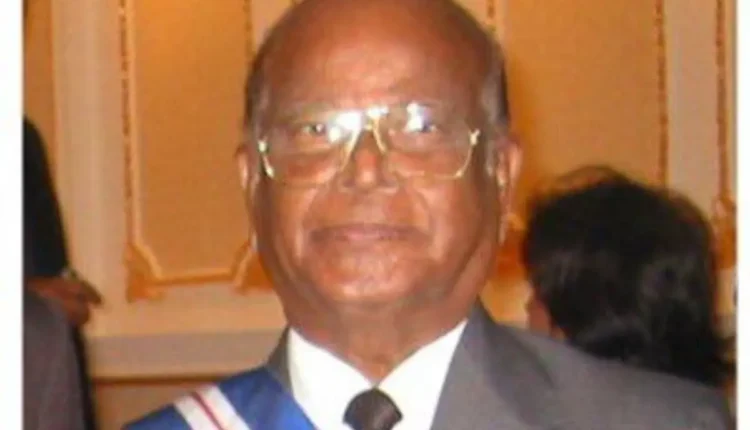The life of Datuk Joseph (1931–2019) is a remarkable narrative of service, dedication, and innovation. As a teacher, politician, and leader, Joseph’s legacy continues to inspire those committed to education, multiculturalism, and preserving cultural heritage.
Known for his role in founding the Sabah Indian Congress and pioneering Malayalam digitisation, Datuk Joseph dedicated his life to uplifting others and enriching Malaysian society. His unwavering commitment to knowledge, cultural preservation, and political engagement left a legacy that still resonates today.
Early Life and a Commitment to Social Change
Datuk Joseph was born on May 13, 1931, on the island of Kumbalangi, near Kochi in Kerala, India. From a young age, Joseph was deeply inspired by the Indian independence movement. At just 12 years old, Datuk Joseph joined the Quit India movement—a courageous act that revealed his early determination to contribute to social change. These early experiences shaped Joseph’s worldview and ignited in him a lifelong passion for politics and public service.
While attending the Teachers’ Training College in Thiruvananthapuram, Datuk Joseph honed his leadership abilities. He participated actively in student government, taking on the title of “Education Minister” in the college’s mock parliament.
Datuk Joseph was a natural leader, inspiring fellow students to engage with the country’s political landscape and advocating for educational reforms. Joseph’s time in India instilled a strong sense of duty and purpose, which he carried with him when he immigrated to North Borneo (present-day Sabah, Malaysia) in 1959.
Educator and Founder of the La Salle School Parliament
Upon his arrival in Jesselton (now Kota Kinabalu) in 1959, Datuk Joseph began teaching science at La Salle Secondary School. He saw in his students the potential for leadership and civic engagement and believed that education extended far beyond textbooks. Recognizing the impending independence of North Borneo, Joseph proposed an innovative concept: a school parliament that would foster political awareness and develop leadership skills among students.
In 1962, Joseph succeeded in establishing the La Salle School Parliament, the first and only student parliament of its kind in Malaysia. His vision was to prepare the youth for active citizenship, empowering them to shape the future of their communities. Over the years, the La Salle School Parliament has inspired thousands of students, standing as a testament to Joseph’s foresight and dedication to youth development. As of 2015, it remained the only such parliamentary system in any Malaysian school, reflecting Joseph’s unique influence on education.
Political Legacy and Founding of the Sabah Indian Congress
In addition to his pioneering work in education, Joseph was a visionary in Malaysian politics. Seeing the need for greater representation of minority communities in the Sabah State Assembly, Datuk Joseph founded the Sabah Indian Congress in 1962. His goal was to give a voice to the Indian diaspora and ensure that their needs were acknowledged within the political landscape of Sabah.
Joseph’s leadership attracted widespread respect, and he eventually rose to the position of general secretary of the Sabah Alliance Party. Through his work, he helped to foster a more inclusive political environment and promote the values of multicultural representation.
However, in 1974, Datuk Joseph made the conscious decision to step down from his political role to dedicate himself fully to teaching and education. This decision demonstrated his enduring belief in the power of education as the foundation for societal progress. His legacy in Sabah politics remains a reminder of the importance of minority representation and the impact of committed leadership.
Contributions to Malayalam Digitisation and Olam
After retiring from teaching in 1986, Datuk Joseph embarked on a new mission: the preservation and digitisation of Malayalam literature. This project was motivated by his love for the Malayalam language and his desire to make it accessible to future generations. Joseph began digitising Malayalam books, including the complete works of the revered poet Changampuzha Krishna Pillai, an ambitious project that helped preserve these texts in digital form.
One of Joseph’s most significant contributions was his transcription of a public-domain Malayalam dictionary. His work caught the attention of Kailash Nadh, the Chief Technology Officer of Zerodha, who was working on creating an online Malayalam-English dictionary called Olam. Nadh incorporated Joseph’s transcriptions into the Olam project, resulting in a comprehensive, user-friendly resource for anyone interested in Malayalam language and literature.
Joseph’s efforts were pivotal in building the corpus for Olam, turning it into one of the most widely used Malayalam dictionaries on the internet today. His contributions to digitisation made Malayalam resources accessible to a global audience, ensuring the preservation of his beloved language.
A Lifelong Partnership: Datin Ritamma and Datuk Joseph
Joseph’s personal life was a partnership in vision and purpose. His wife, Datin Ritamma, was an educator and the former principal of SM St. Michael, Penampang. Together, the couple devoted their lives to teaching, shaping countless young minds. After their retirement in 1986, they continued to support each other’s ambitions and projects, contributing to their community and leaving a legacy of service.
Legacy and Lasting Impact
Datuk K. J. Joseph passed away on January 24, 2019, at the age of 88, leaving behind a remarkable legacy of educational and cultural contributions. His life story is one of resilience, compassion, and commitment to knowledge. He exemplified the ideals of servant leadership, using his talents and abilities to benefit others and promote a society rooted in understanding and inclusion.
Also Read:Trump’s H-1B Reforms: India’s Opportunity to Strengthen Atmanirbhar Bharat

